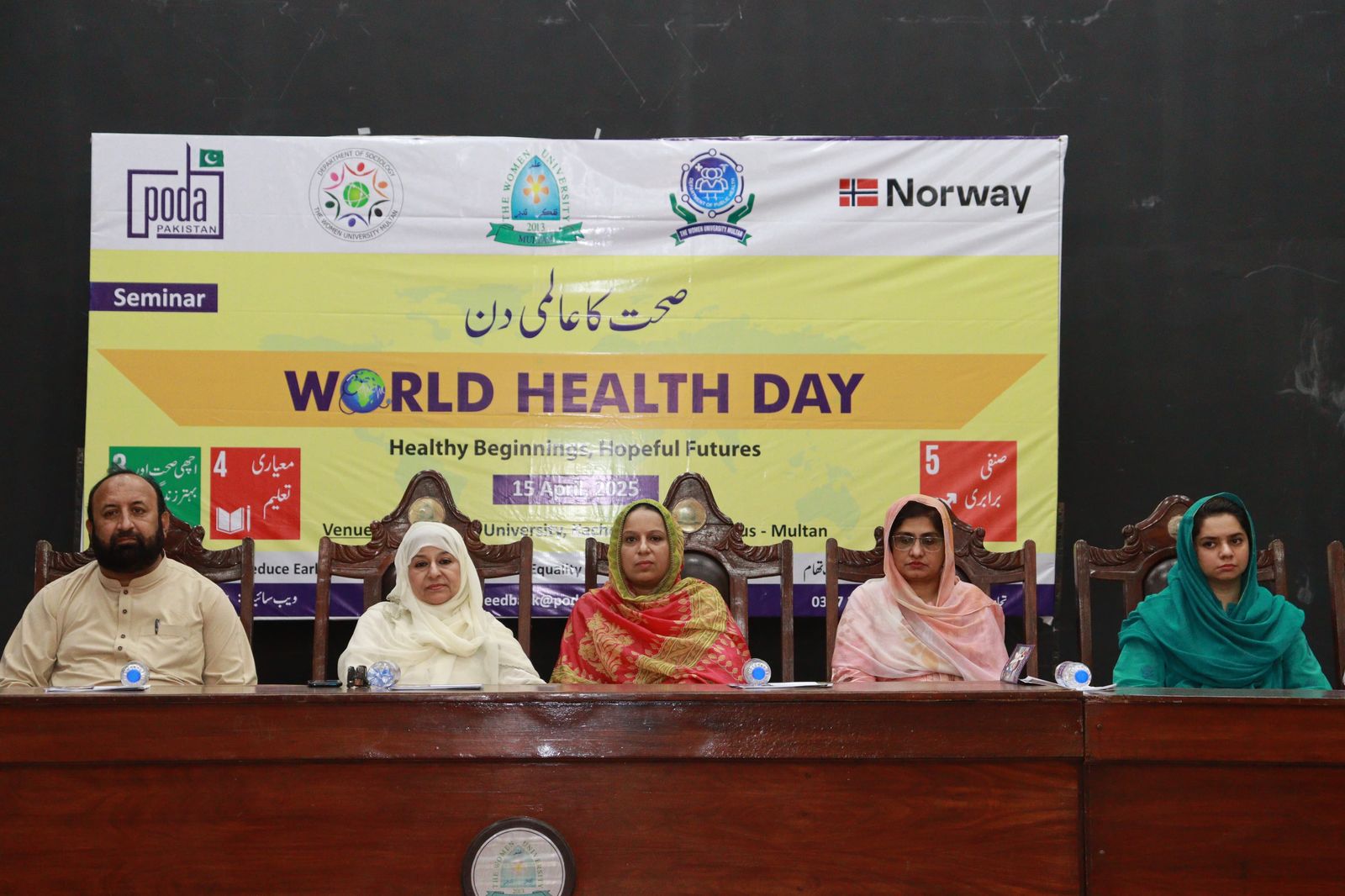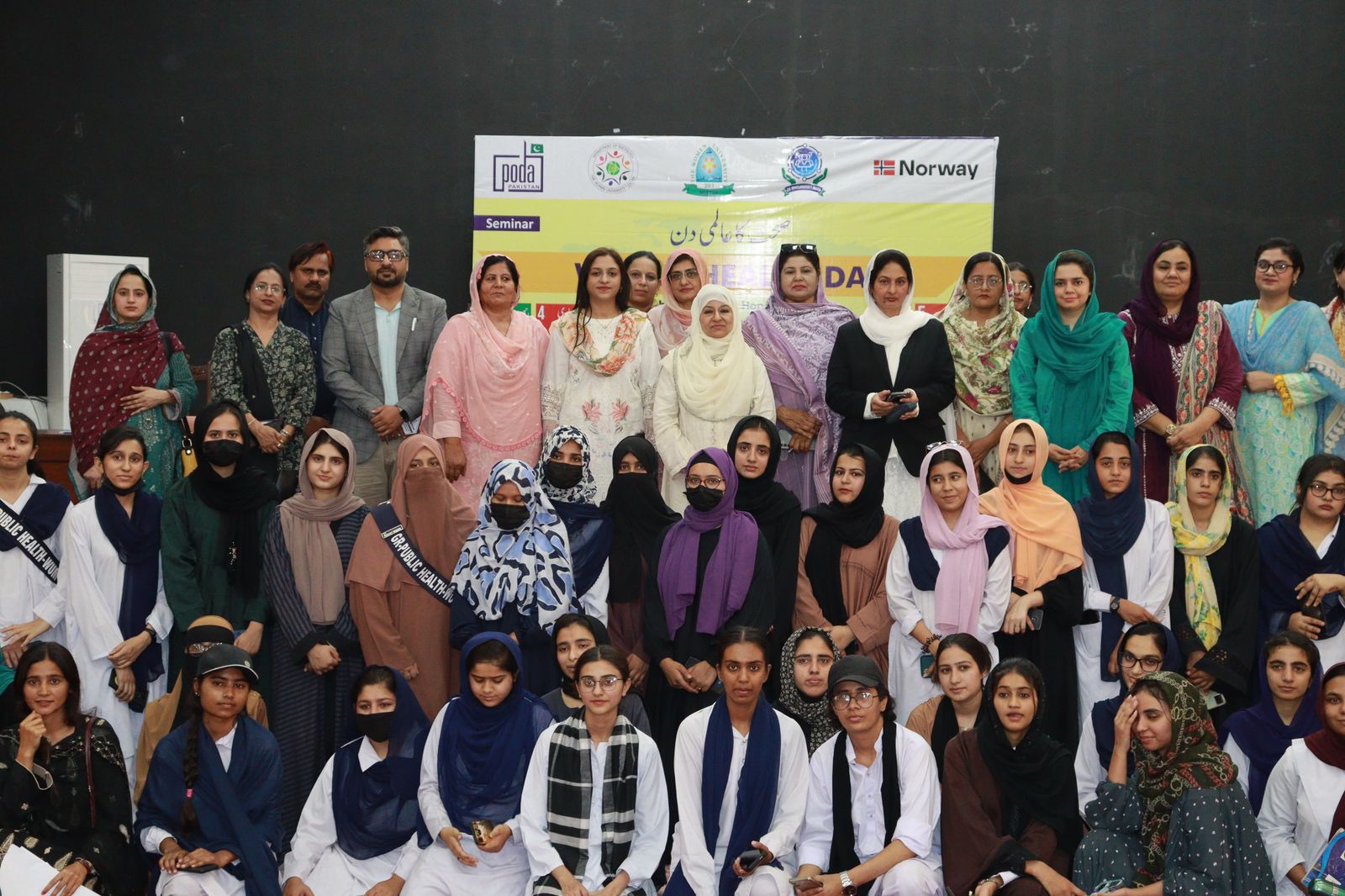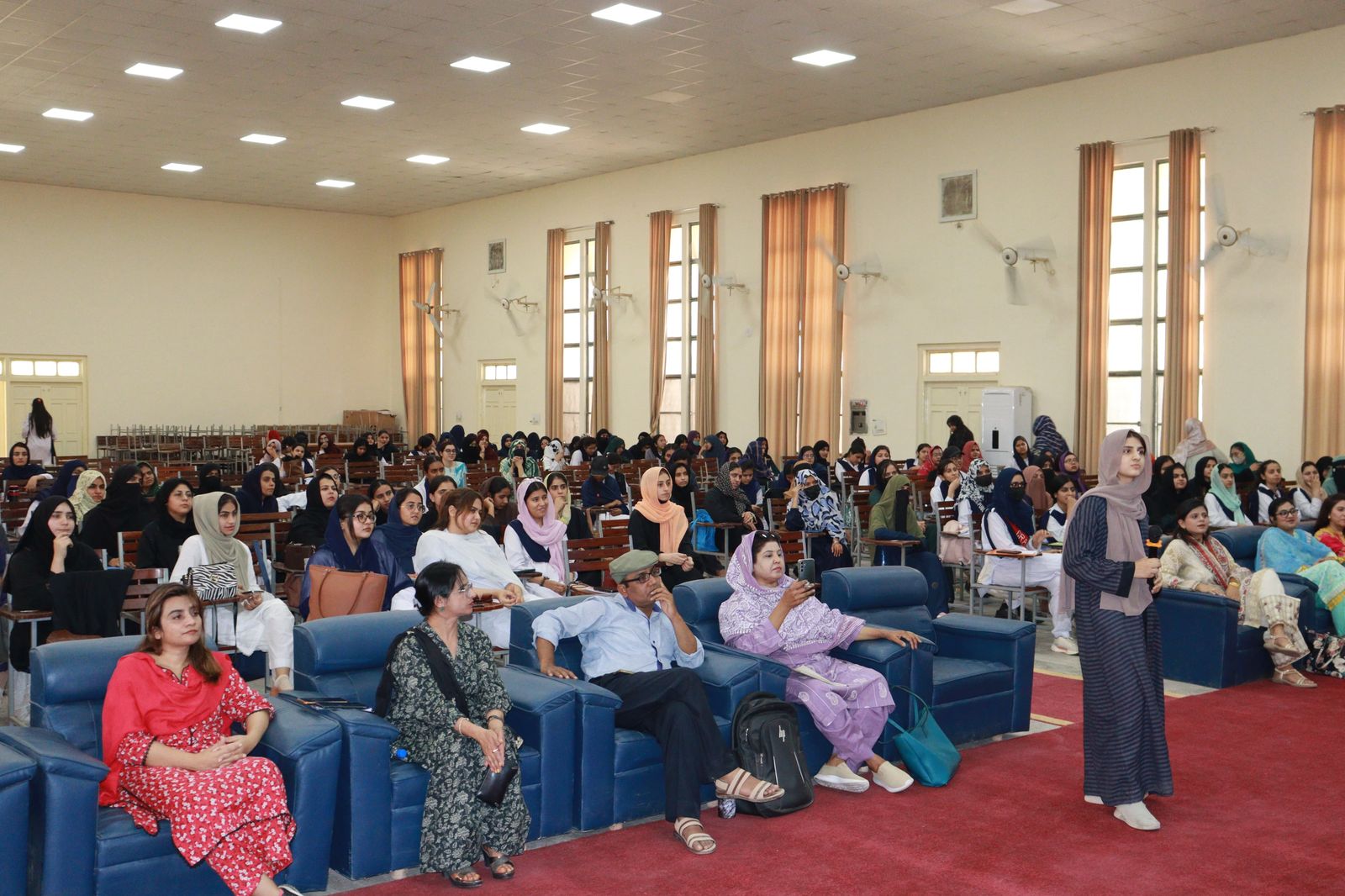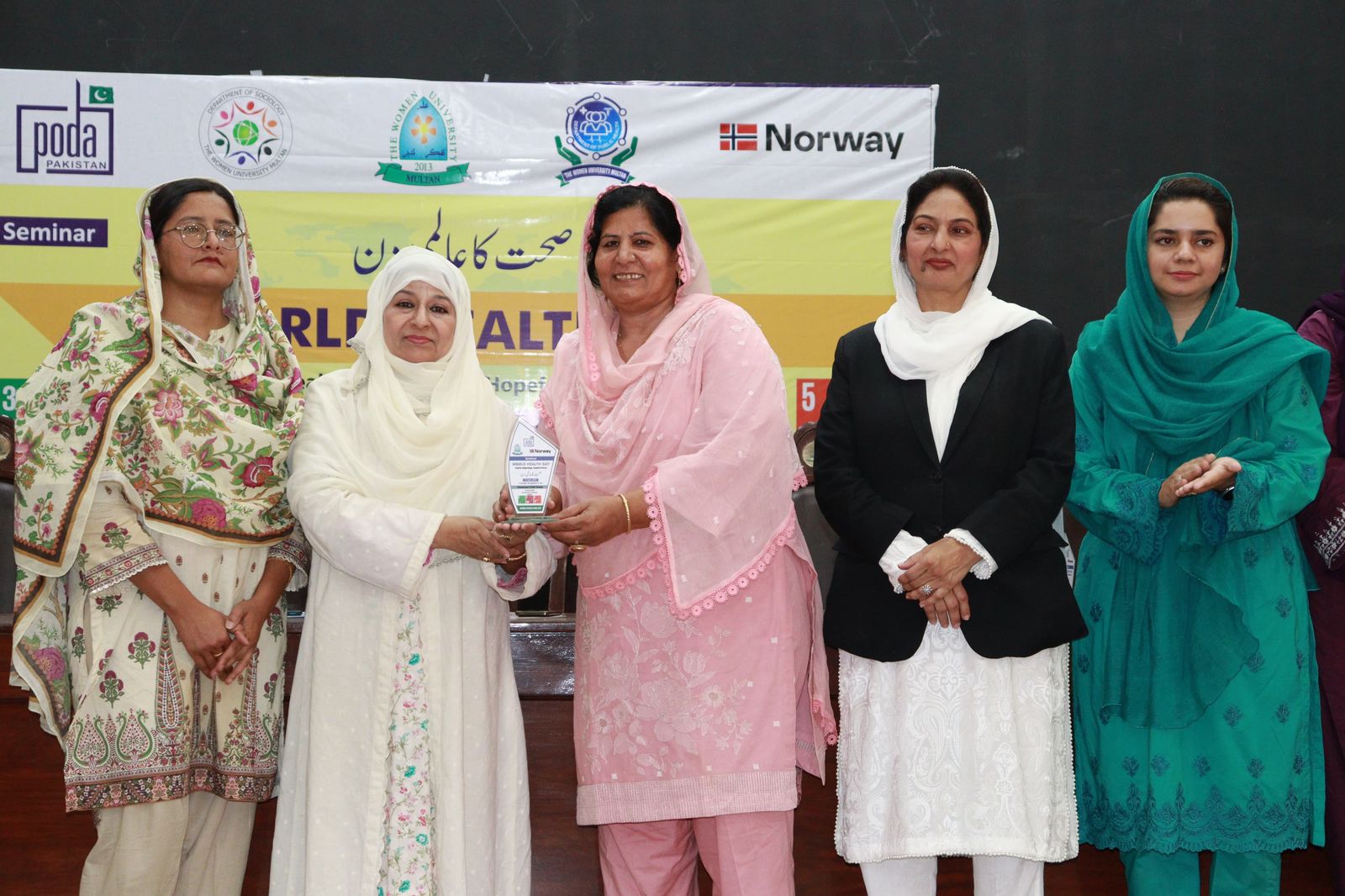
Press Release – World Health Day
Multan; Tuesday 15 April 2025: At a seminar held to mark World Health Day, organized by PODA in collaboration with the Women University, Multan, speakers emphasized the urgent need for a comprehensive program to address women’s reproductive health needs in Pakistan. They highlighted that this is essential, given the numerous challenges women face in accessing and exercising their sexual and reproductive health rights.
The seminar was organized as part of PODA’s three-year project titled “Reduce Early Marriages to Enhance Gender Equality,” running from December 2022 to November 2025, with support from the Norwegian Embassy in Islamabad.
The speakers expressed that child marriage and early childbirth severely impact the physical and mental well-being of young girls, with long-lasting consequences throughout their lives. They emphasized that promoting education is the most effective way to address this issue.
Focusing on the current theme of World Health Day, Ms. Sumera Sattar PODA Coordinator for South Punjab said “recognizing health as a constitutional right is key to quality healthcare for every mother and newborn. Advocacy, policy reforms, and investment in healthcare infrastructure can make this right a reality.” There is no specific article directly related to right to health in the Constitution of Pakistan, she added.
Advocate Muazmah Hasnain stressed to incorporate a legal amendment to raise minimum age of marriage of girls to 18 years in the Child Marriage Restraint Act 2015-Punjab to fulfill country commitment under SDGs, CEDAW and Convention on Child Rights.
Prof. Dr. Kalsoom Paracha, Pro-Vice Chancellor of the Women University, noted that the theme “Healthy Beginnings, Hopeful Futures” brings attention to the critical need for ensuring a healthy start in life. She stated that combating child marriage and expanding access to quality healthcare are key to creating a more equitable and promising future, especially for women and adolescents in Pakistan.
Dr. Khizr Hayat, District Population Welfare Officer highlighted that Pakistan’s population is growing at a rate of 2 percent, and by 2050, it is projected to become the third most populous country in the world. He noted that the five most populous nations—China, India, the United States, Indonesia, and Pakistan—together account for a combined population of 3.6 billion. Citing a United Nations forecast, he warned that the global population is expected to exceed 10 billion by the year 2100. “In this alarming context,” he added, “child marriage—particularly for girls—poses a significant challenge. The abrupt shift in roles, responsibilities, and environment places intense psychological stress on young girls. Their physical and emotional immaturity makes them more vulnerable to serious health conditions such as depression, sepsis, abuse, complications during childbirth, and increased risk of HIV due less say in such matters”. The effects of early marriages extend to future generations. A child born to an educated mother is 50% more likely to survive past the age of five and is twice as likely to attend school, he added.
PODA is implementing a 3-year project, “Reduce Early Marriages to Enhance Gender Equality,” supported by the Norwegian Embassy in Islamabad. The project acknowledges the link between child marriages and healthcare in Pakistan, aiming to reduce early pregnancy and related health risks for young mothers and their children. A key strategy involves advocating for a uniform law establishing a minimum age for marriage to mitigate child marriages and associated health issues. Building on years of efforts to combat gender-based violence, PODA has been instrumental in educating marginalized communities about reproductive healthcare, enabling them to access better facilities and services to safeguard their basic constitutional rights.
The prominent speakers were: Professor Dr. Kalsoom Paracha, Pro-Vice Chancellor of the Women University, Multan; Ms. Um-e-Farwa Hamdani. Divisional Director Social Welfare Department, Multan; Mr. Khizar Hayat, District Population Officer; Mr. Iqbal Sahu, Deputy Director; Dr. Naeem Yousaf, Senior Medical Officer Nishtar Hospital Multan; Advocate Ms. Moazmah Husnain; Ms. Reema Umer, District Manager, Nutritionist at Qatar Charity; Ms. Bissmillah Irum, Chairperson Roshan Rahien, Khanewal who is an active PODA Women Leader; Ms. Aneela Ashraf, Journalist; Dr. Zarmina Rashid, Head of Public Health Department of the University; Dr. Madiha Akram, Head of Department of Sociology of the University, and Jawad Ameen from Rohi Development Organization.
Pakistan affirms its commitment to the 2030 Agenda for Sustainable Development by adopting the Sustainable Development Goals (SDGs) as its own national development agenda through a unanimous National Assembly Resolution in 2016. SDG 3 states “ensure healthy lives and promote wellbeing for all at all ages.” In this perspective, it’s obligation of the government to fulfill all indicators described under SDG 3 specifically and Article 38 of the Constitution of Pakistan which safeguards access to healthcare services.
The World Health Organization (WHO) was founded in 1948 with the goal of promoting health, keeping the world safe, and serving the vulnerable. The First World Health Assembly, held that same year, designated April 7 as World Health Day to be celebrated annually starting from 1950. According to WHO the right to health features in approximately three-quarters of the constitutions of the 194 WHO Member States (at least 140).




